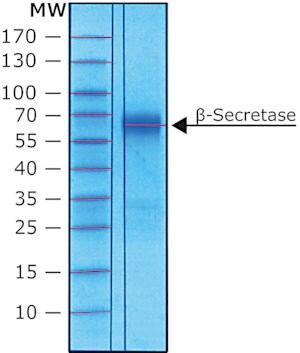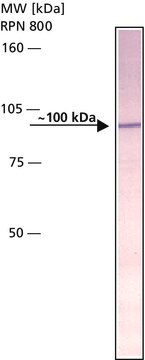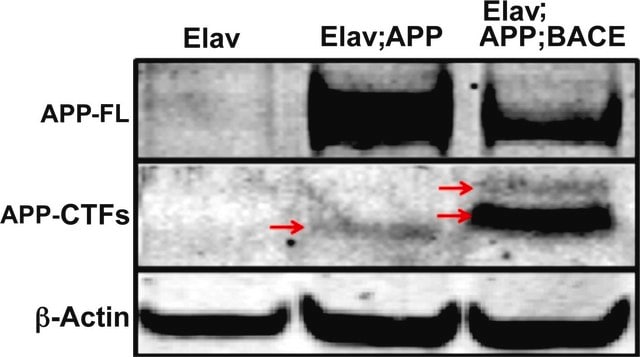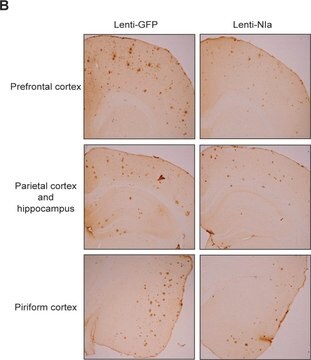S4316
Amyloid Precursor Protein β, Secreted human
recombinant, expressed in E. coli (N-terminal histidine tagged), solution
Sinónimos:
Amyloid Precursor Protein β, Secreted, sAPPβ
Iniciar sesiónpara Ver la Fijación de precios por contrato y de la organización
About This Item
Productos recomendados
Descripción general
Amyloid-β (Aβ) peptides are a major component of the senile plaques characteristic of the Alzheimer brain. It is a type- I transmembrane protein. The gene encoding amyloid-β is localized on human chromosome 21.
Aplicación
Human amyloid precursor protein β has been used as peptide standard.
Acciones bioquímicas o fisiológicas
The secreted amyloid precursor β (sAPPβ) is a proteolytic cleavage product of β amyloid precursor protein (APP). APP is cleaved by β-secretase into two fragments, sAPPβ and β-amyloid peptide (Aβ). The Aβ is a component of amyloid plaques, one of the major hallmarks of Alzheimer`s disease (AD), while the sAPPβ is thought to modulate neuronal function and cell survival. Mutation in APP found in Swedish familial AD pedigree increases the susceptibility of APP to β-secretase cleavage and the formation of Aβ and sAPPβ. In contrast, activation of protein kinase C (PKC) decreases the levels of sAPPβ. The trans-Golgi network (TGN) is the major site for β-secretase activity.
Forma física
0.2 μm filtered solution in 20 mM Tris (pH 7.4), 0.5 M NaCl, 1 mM EDTA, 5 mM βME, 2 μg/ml aprotinin
Nota de preparación
sAPPβ was expressed in E. coli as a soluble protein and purified under non-denaturing conditions
Código de clase de almacenamiento
10 - Combustible liquids
Clase de riesgo para el agua (WGK)
WGK 1
Punto de inflamabilidad (°F)
Not applicable
Punto de inflamabilidad (°C)
Not applicable
Equipo de protección personal
Eyeshields, Gloves, multi-purpose combination respirator cartridge (US)
Elija entre una de las versiones más recientes:
¿Ya tiene este producto?
Encuentre la documentación para los productos que ha comprado recientemente en la Biblioteca de documentos.
D J Selkoe
Nature, 399(6738 Suppl), A23-A31 (1999-07-07)
Studies of the molecular basis of Alzheimer's disease exemplify the increasingly blurred distinction between basic and applied biomedical research. The four genes so far implicated in familial Alzheimer's disease have each been shown to elevate brain levels of the self-aggregating
The Processing of Amyloid Precursor Protein in the
Central Nervous System of Humans and Rhesus
Macaques
Central Nervous System of Humans and Rhesus
Macaques
Justyna Anna Dobrowolska
The West Virginia Medical Journal (2013)
Monomeric Amyloid Beta Peptide in Hexafluoroisopropanol Detected by Small Angle Neutron Scattering.
Zhang-Haagen B
PLoS ONE (2016)
C Haass et al.
Nature, 357(6378), 500-503 (1992-06-11)
Progressive cerebral deposition of the amyloid beta-peptide is an early and invariant feature of Alzheimer's disease. The beta-peptide is released by proteolytic cleavages from the beta-amyloid precursor protein (beta APP), a membrane-spanning glycoprotein expressed in most mammalian cells. Normal secretion
D M Skovronsky et al.
The Journal of biological chemistry, 275(4), 2568-2575 (2000-01-25)
The release of amyloidogenic amyloid-beta peptide (Abeta) from amyloid-beta precursor protein (APP) requires cleavage by beta- and gamma-secretases. In contrast, alpha-secretase cleaves APP within the Abeta sequence and precludes amyloidogenesis. Regulated and unregulated alpha-secretase activities have been reported, and the
Artículos
Alzheimer's disease (AD) is the most common cause of dementia in the elderly and is characterized by gradual loss of cognitive functions.
Nuestro equipo de científicos tiene experiencia en todas las áreas de investigación: Ciencias de la vida, Ciencia de los materiales, Síntesis química, Cromatografía, Analítica y muchas otras.
Póngase en contacto con el Servicio técnico





